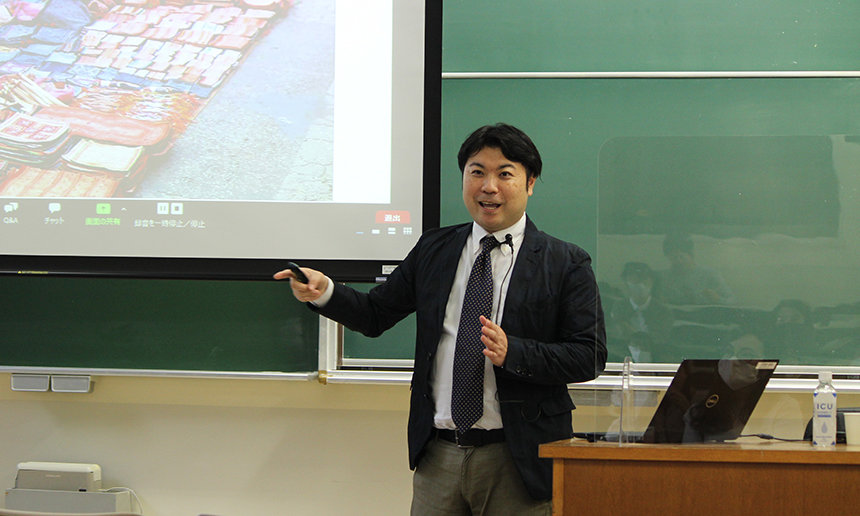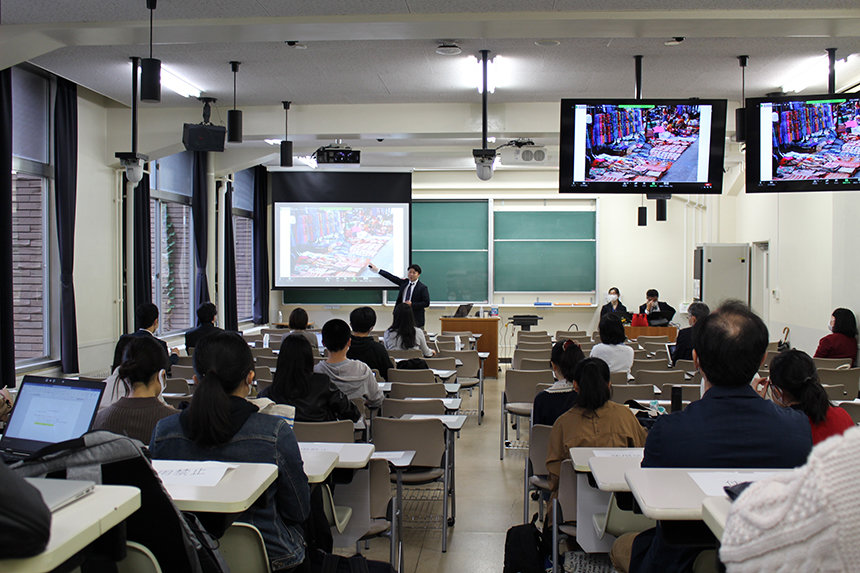NEWS
Lecture "Change the World Through Cacao" Held
Update: November 2, 2020

On Friday, October 9, ICU President Shoichiro Iwakiri hosted a lecture inviting Mr. Keiichi Yoshino, President and CEO of Kyoto-based chocolate specialty shop, Dari K , which is causing a revolution in society through cacao. The lecture was held in a hybrid format combining face-to-face and online participation in order to prevent the spread of coronavirus infection.
The lecture hosted by the ICU president is a part of the lecture series titled "Modern Society and Liberal Arts," inviting leading authorities in various fields who would speak about how people are connected to society through their work. This was the first in the series.
During the lecture, Mr. Yoshino talked about the path he walked from his university years to the time when he founded Dari K with a corporate philosophy of "Changing the World Through Cacao." He also spoke about why he had set "building a society where people are rewarded for their efforts" as the goal of his life through introducing a few events in his life that had served as turning points.
The first of such events was the encounter with a Hmong girl who spoke Japanese and was working at a market in Luang Prabang in Laos where he visited during his university days. There were no schools or any lessons offered to study Japanese where she lived. However, she was living with a positive attitude taking advantage of her encounters with Japanese people visiting the market as opportunities to study Japanese. Mr. Yoshino was deeply moved by her attitude, re-examined the life he had lived, and decided to aim at working for an international agency with a mission to rectify the situations faced by children who could not go to school.

While he was working for a financial institution still aiming to secure a job at an international agency, he happened to see a world map stating the production volume of cacao by country, which became one of the triggers for him to start up Dari K. He then spoke about his actions taken following this encounter.
On this map, it was shown that the largest cacao producing country was Cote d'lvoire, followed by Ghana and Indonesia . Looking at this, a question came to Mr. Yoshino's mind. "Indonesia is the third largest cacao beans producer in the world. In spite of its geographical proximity, why are they not being imported into Japan?" In search for an answer, he visited cacao farmers on the Sulawesi island of Indonesia to conduct a field study. As a result, he discovered that in Indonesia, they were skipping the fermentation process that is indispensable to the production of good quality cacao beans, thereby producing low-quality beans. "Why are they not fermenting the beans then?" It was because it had been widely understood that Indonesian cacao beans were poor in quality and the implicit rule in the market was to trade them at lower prices compared to international prices. The situation was such that even fermented Indonesian cacao beans were sold at very similar prices as those that were not fermented and considered to be of poor quality. Even though cacao famers took time and efforts to produce good-quality fermented beans, they were purchased at prices as low as non-fermented beans. Mr. Yoshino came to realize that there was an environment where efforts made were not recognized. He said that this reality made him decide to found Dari K, with a goal to "build a society where efforts are rewarded."
At the end of the lecture, bringing his own experience of encountering the Hmong girl and of taking action prompted by his questions on the cacao beans production volume versus the import volume, Mr. Yoshino strongly encouraged the students, "Your life can change depending on your actions, even if you are placed in the same environment as others. Do not make excuses of the environment you are in. Challenge yourself and the environment. If you don't take actions, the world won't change, and you won't change."
After the lecture, a student asked him, "How do you handle risks involved in challenging yourself and taking actions?" Mr. Yoshino answered, "Before challenging yourself, your mind may be occupied by the thoughts of risks only and you may not think of successful outcomes. There are things that you can't see until you begin to move and take actions. You should believe your intuition and challenge yourself if you feel you would regret it if you don't."
